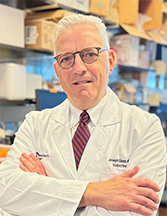National Academy of Medicine
George D. Lundberg, elected 1992

George Lundberg, MD, is recognized internationally for his work in tropical medicine and forensic medicine. He is widely regarded as an early pioneer of the medical internet. For 17 years, Lundberg served as the editorial lead on 39 American Medical Association medical journals, “American Medical News” and various internet products.
Dudley Childress, elected 1995
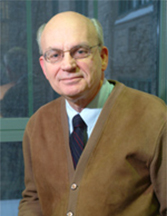
Dudley Childress, PhD, was a faculty member at Feinberg for 47 years in the Department of Physical Medicine and Rehabilitation before his retirement. He was a pioneer in biomechanics and rehabilitative engineering. Producing the first power controlled wheelchair and developing a state-of-the-art motion analysis system were among his many contributions to rehabilitative medicine.
Thomas E. Starzl, elected 1999

Thomas E. Starzl, MD '52, PhD '52, and faculty member at Northwestern (1959-61), known as the father of transplantation, performed the first successful liver transplant in 1967 at the University of Colorado. Starzl also conducted the first multiple organ transplant in 1983, the first heart and liver transplant in 1984 and the first liver and intestine transplant in 1990. In 1980, he introduced the anti-rejection medications anti-lymphocyte globulin and cyclosporine. He was instrumental in developing tacrolimus, a drug that significantly increased post-transplantation survival rates.
Michael Fleming, elected 2005
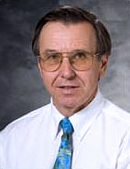
Michael Fleming, MD, MPH, professor emeritus of Psychiatry and Behavioral Sciences, has served as the principal investigator on more than a dozen National Institutes of Health grants and contracts related to behavioral interventions in community-based primary care practices. In 2005, he was elected to the Institute of Medicine of the National Academy of Sciences. Since then, Fleming has published more than 135 peer-reviewed research papers in more than 40 publications.
J. Larry Jameson, elected 2005
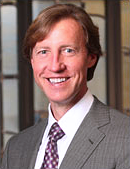
J. Larry Jameson, MD, PhD, served as chair of the Department of Medicine from 2000 to 2007, when he was named vice president for medical affairs and dean of the medical school. He has a long-standing interest in the genetics of endocrine tumors and possible approaches to their treatment. He has published more than 250 scientific articles and co-edited the fourth and the fifth editions of the authoritative text, “DeGroot and Jameson’s Endocrinology.”
Chad A. Mirkin, elected 2010
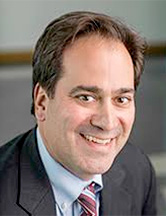
Chad Mirkin, PhD, is a chemist and world-renowned nanoscience expert known for his discovery and development of spherical nucleic acids and contributions to supramolecular chemistry and nanoparticle synthesis. He has authored over 870 manuscripts and over 1,200 patent applications worldwide (over 430 issued) and founded multiple companies. He is an Associate Editor of JACS and a PNAS Editorial Board Member.
David J. Skorton, elected 2010
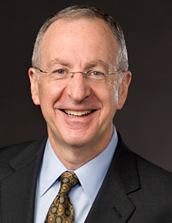
David J. Skorton, MD, is the secretary of the Smithsonian Institution in Washington, D.C. He graduated from Northwestern University in 1970 and the Feinberg School of Medicine in 1974. He received the Distinguished Alumni Award from the Feinberg School of Medicine in 2009.
Serdar E. Bulun, elected 2015
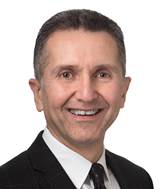
Serdar Bulun, MD, chair of Obstetrics and Gynecology, is widely recognized for pioneering molecular medicine in the field of gynecology. He discovered the epigenetic basis of endometriosis and introduced aromatase inhibitors as a novel class of drugs to effectively treat it. He has also contributed significantly to the systems biology of hormone-responsive disorders of the breast, including cancer.
Susan Skochelak, elected 2015
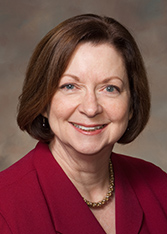
Susan Skochelak, MD, MPH, is a nationally recognized authority in medical education. She serves as the group vice president for medical education at the American Medical Association, where she leads the strategic initiative “Accelerating Change in Medical Education,” and created the AMA Center to Transform Medical Education.
Melina Kibbe, elected 2016

Melina Kibbe, MD, ’03 GME, is an expert in the treatment of carotid stenosis, peripheral vascular disease and abdominal aortic aneurysms. From 2011-2016, she served as deputy director of Northwestern’s Simpson Querrey Institute for BioNanotechnology and vice chair of the Department of Surgery. Northwestern recognized Kibbe for her outstanding talents as an educator of the next generation of surgeons, honoring her with 18 awards for teaching excellence.
Clyde W. Yancy, elected 2016
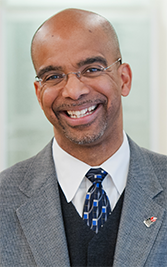
Clyde Yancy, MD, MSc, is an internationally recognized expert in preventive cardiology, cardiomyopathy and racial and ethnic disparities in cardiovascular disease. He serves as vice dean for Health Equity and chief of Cardiology in the Department of Medicine. Yancy is also a member of the National Academy of Medicine and a former president of the American Heart Association.
Scott Hultgren, elected 2017
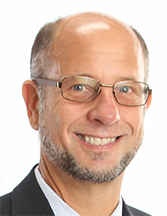
Scott Hultgren, PhD, received his doctorate in Microbiology-Immunology from Northwestern University Feinberg School of Medicine. His focus has been in elucidating basic mechanisms of bacterial pathogenesis and to study the molecular details of host-pathogen interactions that occur during urinary tract infections caused by E. coli. At Washington University, he has become a worldwide authority on issues relating to the structure and function of adhesive fibers called pili that play critical and unexpected roles in host-pathogen interactions along the urinary tract.
Virgil Craig Jordan, elected 2017
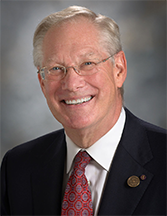
V. Craig Jordan, PhD, MD (Hon.), was professor of Molecular Pharmacology (1993-2004) at Feinberg, the Diana Princess of Wales Professor of Cancer Research (2000-2004), and Director of the Lynn Sage Cancer Research Program at the Robert H. Lurie Cancer Center. He received an OBE (2006) from Queen Elizabeth and numerous other awards. Jordan is known as the father of Tamoxifen for the treatment of breast cancer. He finished his career at the MD Anderson Cancer Center.
Teresa K. Woodruff, elected 2018
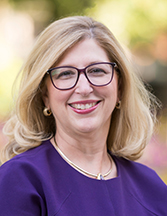
Teresa Woodruff, PhD, is an expert in ovarian biology. She is credited with coining the term "oncofertility" in 2006. Woodruff served as the chief of the Division of Reproductive Science in Medicine in the Department of Obstetrics & Gynecology and founded the Women’s Health Research Institute. She is a member of the National Academies of Medicine and Inventors and the American Academy of Arts and Sciences.
David Cella, elected 2019
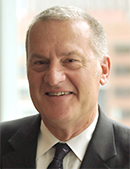
David Cella, PhD, helped establish the Feinberg Department of Medical Social Sciences as inaugural chair in 2009, helming the department for more than a decade. A social scientist by training, Cella is internationally regarded for his innovations in measuring patient-reported outcomes and applying those measurements to clinical applications, including those used in health information technology.
Susan Quaggin, elected 2019
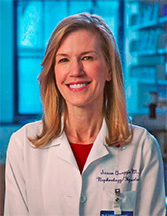
Susan Quaggin, MD, has helped enhance the understanding of common glomerular diseases and inspired the development of promising therapeutics, including discoveries regarding blood vessels, lymphatics and specialized hybrid circulations. Quaggin and her collaborators are attempting to bioengineer new organs in a dish as well as study the mechanisms of glaucoma. She is the director of the Feinberg Cardiovascular and Renal Research Institute and chief of Nephrology and Hypertension in the Department of Medicine and past-president of the American Society of Nephrology.
John A. Rogers, elected 2019
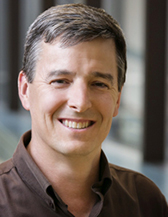
John Rogers, PhD, is internationally known for designing and developing classes of electronic devices with diverse diagnostic and therapeutic function that can bend, stretch and twist to integrate with the human body. His research spans disciplines and exploits novel approaches to problems with the potential to change the fields of industrial, consumer and biocompatible electronics. He is a member of the National Academies of Engineering, Inventors, Medicine and Sciences, as well as the American Academy of Arts and Sciences. His election to the Royal Society makes him only one of three scientists who are members of all three U.S. National Academies and the Royal Society.
Catherine Woolley, elected 2019
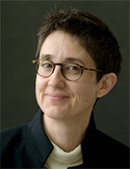
Catherine Woolley, PhD, focuses her research on understanding estrogen’s actions in cognitive areas of the brain and sex differences in molecular mechanisms of synaptic plasticity. Early in her career, Woolley discovered that estrogens drive synaptic plasticity in the hippocampus. Since then, her work has helped to explain how estrogens enhance learning and memory consolidation.
William Grobman, elected 2020
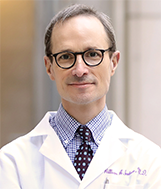
William Grobman, MD, MBA, ’97 ’00 GME, investigates prediction and prevention of adverse obstetric health outcomes, such as preterm birth and preeclampsia. This research includes evaluations of chronic stress and other social determinants of health. He also has focused on determining approaches to labor and delivery that can help to safely reduce the chance of cesarean delivery.
Carla Pugh, elected 2021

Guillermo A. Ameer, elected 2021
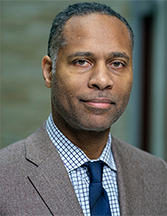
Guillermo Ameer, ScD, is widely recognized for pioneering regenerative biomaterials based on a novel class of biodegradable polymers containing citrate, and using them to regenerate a variety of tissues and organs. He was elected into the National Academy of Medicine in 2021 for his work bringing regenerative engineering technology into clinical care.
Elizabeth M. McNally, elected 2021
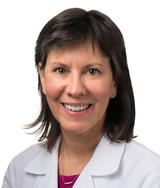
Elizabeth McNally, MD, PhD, investigates the genetic mechanisms responsible for inherited human diseases including heart failure, cardiomyopathy, muscular dystrophy, arrhythmias and aortic aneurysms. McNally’s contributions to genome analysis have bettered understanding of rare genetic variation, allowing identification of genes that modify the outcomes of genetic diseases. She is a member of the National Academy of Medicine, National Academy of Inventors and the American Academy of Arts and Sciences.
Melissa Simon, elected 2021

Dimitri Krainc, elected 2022
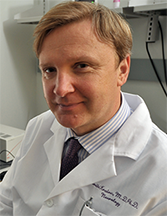
Dimitri Krainc, MD, PhD, Aaron Montgomery Ward Professor, chair of the Ken & Ruth Davee Department of Neurology and director of the Simpson Querrey Center for Neurogenetics, has dedicated his scientific career to studying molecular pathways in the pathogenesis of neurodegeneration. Informed by genetic causes of disease, his work has uncovered key lysosomal and mitochondrial mechanisms across different neurodegenerative disorders that has led to pioneering design and development of targeted therapies. He is a member of the Association of American Physicians, the National Academy of Inventors and the National Academy of Medicine.
Alexis Thompson, elected 2024
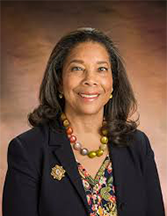
Joseph Bass, elected 2025
